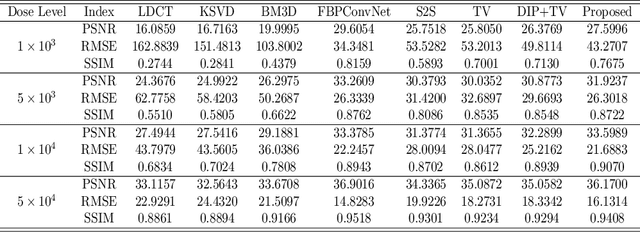Qiaoqiao Ding
Dynamic PET Image Reconstruction via Non-negative INR Factorization
Mar 11, 2025Abstract:The reconstruction of dynamic positron emission tomography (PET) images from noisy projection data is a significant but challenging problem. In this paper, we introduce an unsupervised learning approach, Non-negative Implicit Neural Representation Factorization (\texttt{NINRF}), based on low rank matrix factorization of unknown images and employing neural networks to represent both coefficients and bases. Mathematically, we demonstrate that if a sequence of dynamic PET images satisfies a generalized non-negative low-rank property, it can be decomposed into a set of non-negative continuous functions varying in the temporal-spatial domain. This bridges the well-established non-negative matrix factorization (NMF) with continuous functions and we propose using implicit neural representations (INRs) to connect matrix with continuous functions. The neural network parameters are obtained by minimizing the KL divergence, with additional sparsity regularization on coefficients and bases. Extensive experiments on dynamic PET reconstruction with Poisson noise demonstrate the effectiveness of the proposed method compared to other methods, while giving continuous representations for object's detailed geometric features and regional concentration variation.
Bi-modality Images Transfer with a Discrete Process Matching Method
Sep 06, 2024Abstract:Recently, medical image synthesis gains more and more popularity, along with the rapid development of generative models. Medical image synthesis aims to generate an unacquired image modality, often from other observed data modalities. Synthesized images can be used for clinical diagnostic assistance, data augmentation for model training and validation or image quality improving. In the meanwhile, the flow-based models are among the successful generative models for the ability of generating realistic and high-quality synthetic images. However, most flow-based models require to calculate flow ordinary different equation (ODE) evolution steps in transfer process, for which the performances are significantly limited by heavy computation time due to a large number of time iterations. In this paper, we propose a novel flow-based model, namely Discrete Process Matching (DPM) to accomplish the bi-modality image transfer tasks. Different to other flow matching based models, we propose to utilize both forward and backward ODE flow and enhance the consistency on the intermediate images of few discrete time steps, resulting in a transfer process with much less iteration steps while maintaining high-quality generations for both modalities. Our experiments on three datasets of MRI T1/T2 and CT/MRI demonstrate that DPM outperforms other state-of-the-art flow-based methods for bi-modality image synthesis, achieving higher image quality with less computation time cost.
SyMOT-Flow: Learning optimal transport flow for two arbitrary distributions with maximum mean discrepancy
Aug 26, 2023Abstract:Finding a transformation between two unknown probability distributions from samples is crucial for modeling complex data distributions and perform tasks such as density estimation, sample generation, and statistical inference. One powerful framework for such transformations is normalizing flow, which transforms an unknown distribution into a standard normal distribution using an invertible network. In this paper, we introduce a novel model called SyMOT-Flow that trains an invertible transformation by minimizing the symmetric maximum mean discrepancy between samples from two unknown distributions, and we incorporate an optimal transport cost as regularization to obtain a short-distance and interpretable transformation. The resulted transformation leads to more stable and accurate sample generation. We establish several theoretical results for the proposed model and demonstrate its effectiveness with low-dimensional illustrative examples as well as high-dimensional generative samples obtained through the forward and reverse flows.
Dataset-free Deep learning Method for Low-Dose CT Image Reconstruction
May 01, 2022



Abstract:Low-dose CT (LDCT) imaging attracted a considerable interest for the reduction of the object's exposure to X-ray radiation. In recent years, supervised deep learning has been extensively studied for LDCT image reconstruction, which trains a network over a dataset containing many pairs of normal-dose and low-dose images. However, the challenge on collecting many such pairs in the clinical setup limits the application of such supervised-learning-based methods for LDCT image reconstruction in practice. Aiming at addressing the challenges raised by the collection of training dataset, this paper proposed a unsupervised deep learning method for LDCT image reconstruction, which does not require any external training data. The proposed method is built on a re-parametrization technique for Bayesian inference via deep network with random weights, combined with additional total variational (TV) regularization. The experiments show that the proposed method noticeably outperforms existing dataset-free image reconstruction methods on the test data.
 Add to Chrome
Add to Chrome Add to Firefox
Add to Firefox Add to Edge
Add to Edge